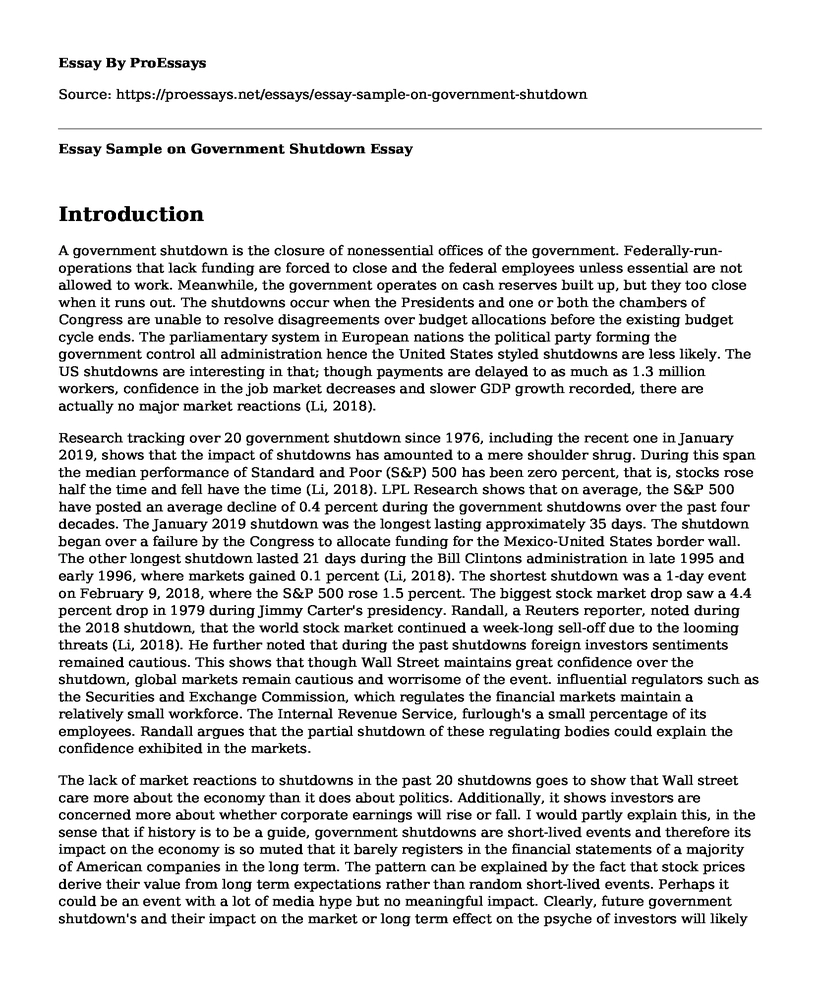Introduction
A government shutdown is the closure of nonessential offices of the government. Federally-run-operations that lack funding are forced to close and the federal employees unless essential are not allowed to work. Meanwhile, the government operates on cash reserves built up, but they too close when it runs out. The shutdowns occur when the Presidents and one or both the chambers of Congress are unable to resolve disagreements over budget allocations before the existing budget cycle ends. The parliamentary system in European nations the political party forming the government control all administration hence the United States styled shutdowns are less likely. The US shutdowns are interesting in that; though payments are delayed to as much as 1.3 million workers, confidence in the job market decreases and slower GDP growth recorded, there are actually no major market reactions (Li, 2018).
Research tracking over 20 government shutdown since 1976, including the recent one in January 2019, shows that the impact of shutdowns has amounted to a mere shoulder shrug. During this span the median performance of Standard and Poor (S&P) 500 has been zero percent, that is, stocks rose half the time and fell have the time (Li, 2018). LPL Research shows that on average, the S&P 500 have posted an average decline of 0.4 percent during the government shutdowns over the past four decades. The January 2019 shutdown was the longest lasting approximately 35 days. The shutdown began over a failure by the Congress to allocate funding for the Mexico-United States border wall. The other longest shutdown lasted 21 days during the Bill Clintons administration in late 1995 and early 1996, where markets gained 0.1 percent (Li, 2018). The shortest shutdown was a 1-day event on February 9, 2018, where the S&P 500 rose 1.5 percent. The biggest stock market drop saw a 4.4 percent drop in 1979 during Jimmy Carter's presidency. Randall, a Reuters reporter, noted during the 2018 shutdown, that the world stock market continued a week-long sell-off due to the looming threats (Li, 2018). He further noted that during the past shutdowns foreign investors sentiments remained cautious. This shows that though Wall Street maintains great confidence over the shutdown, global markets remain cautious and worrisome of the event. influential regulators such as the Securities and Exchange Commission, which regulates the financial markets maintain a relatively small workforce. The Internal Revenue Service, furlough's a small percentage of its employees. Randall argues that the partial shutdown of these regulating bodies could explain the confidence exhibited in the markets.
The lack of market reactions to shutdowns in the past 20 shutdowns goes to show that Wall street care more about the economy than it does about politics. Additionally, it shows investors are concerned more about whether corporate earnings will rise or fall. I would partly explain this, in the sense that if history is to be a guide, government shutdowns are short-lived events and therefore its impact on the economy is so muted that it barely registers in the financial statements of a majority of American companies in the long term. The pattern can be explained by the fact that stock prices derive their value from long term expectations rather than random short-lived events. Perhaps it could be an event with a lot of media hype but no meaningful impact. Clearly, future government shutdown's and their impact on the market or long term effect on the psyche of investors will likely have no consequences.
References
Li, Y. (2018, March 28). A government shutdown typically doesn't hurt the stock market, history shows. Retrieved from https://www.cnbc.com/2018/12/21/a-government-shutdown-typically-doesnt-hurt-the-stock-market-history-shows.html
Randall, D. (2018, December 21). Global stock indexes slide as U.S. government shutdown looms. Retrieved from https://www.reuters.com/article/us-global-markets/global-growth-worries-u-s-government-shutdown-threat-hit-stocks-idUSKCN1OK02P
Cite this page
Essay Sample on Government Shutdown. (2022, Nov 08). Retrieved from https://proessays.net/essays/essay-sample-on-government-shutdown
If you are the original author of this essay and no longer wish to have it published on the ProEssays website, please click below to request its removal:
- Levitsky and Way vs. Diamond Debate: Democracy in Recession
- The 8152nd Security Council Meeting - Paper Example
- How the Failure of the Election System Contributed to Post-election Violence in Kenya's Previous 'Democratic' Elections?
- Experience From Your Life That Changed the Way You Think About Multicultural Communities
- Nelson Mandela Contribution to the Anti-Apartheid Movement
- Victim Offers Mediation Programs: Fear & Low Self-Esteem - Essay Sample
- Strategic Training: Key to Instilling Healthcare Policies and Procedures - Report Sample







